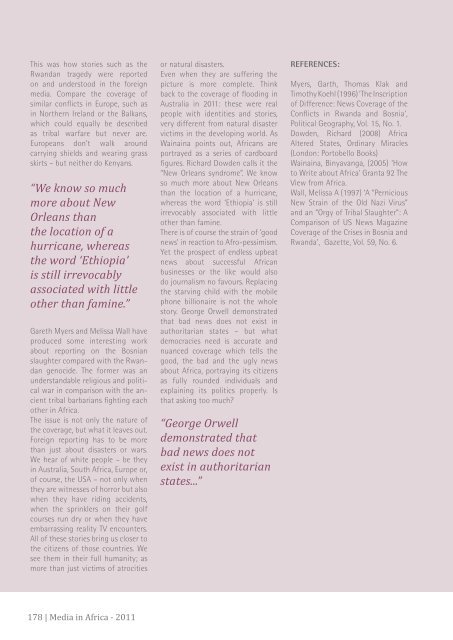Twenty years after the Windhoek Declaration on press freedom
Twenty years after the Windhoek Declaration on press freedom
Twenty years after the Windhoek Declaration on press freedom
Create successful ePaper yourself
Turn your PDF publications into a flip-book with our unique Google optimized e-Paper software.
This was how stories such as <str<strong>on</strong>g>the</str<strong>on</strong>g><br />
Rwandan tragedy were reported<br />
<strong>on</strong> and understood in <str<strong>on</strong>g>the</str<strong>on</strong>g> foreign<br />
media. Compare <str<strong>on</strong>g>the</str<strong>on</strong>g> coverage of<br />
similar c<strong>on</strong>flicts in Europe, such as<br />
in Nor<str<strong>on</strong>g>the</str<strong>on</strong>g>rn Ireland or <str<strong>on</strong>g>the</str<strong>on</strong>g> Balkans,<br />
which could equally be described<br />
as tribal warfare but never are.<br />
Europeans d<strong>on</strong>’t walk around<br />
carrying shields and wearing grass<br />
skirts – but nei<str<strong>on</strong>g>the</str<strong>on</strong>g>r do Kenyans.<br />
“We know so much<br />
more about New<br />
Orleans than<br />
<str<strong>on</strong>g>the</str<strong>on</strong>g> locati<strong>on</strong> of a<br />
hurricane, whereas<br />
<str<strong>on</strong>g>the</str<strong>on</strong>g> word ‘Ethiopia’<br />
is still irrevocably<br />
associated with little<br />
o<str<strong>on</strong>g>the</str<strong>on</strong>g>r than famine.”<br />
Gareth Myers and Melissa Wall have<br />
produced some interesting work<br />
about reporting <strong>on</strong> <str<strong>on</strong>g>the</str<strong>on</strong>g> Bosnian<br />
slaughter compared with <str<strong>on</strong>g>the</str<strong>on</strong>g> Rwandan<br />
genocide. The former was an<br />
understandable religious and political<br />
war in comparis<strong>on</strong> with <str<strong>on</strong>g>the</str<strong>on</strong>g> ancient<br />
tribal barbarians fighting each<br />
o<str<strong>on</strong>g>the</str<strong>on</strong>g>r in Africa.<br />
The issue is not <strong>on</strong>ly <str<strong>on</strong>g>the</str<strong>on</strong>g> nature of<br />
<str<strong>on</strong>g>the</str<strong>on</strong>g> coverage, but what it leaves out.<br />
Foreign reporting has to be more<br />
than just about disasters or wars.<br />
We hear of white people – be <str<strong>on</strong>g>the</str<strong>on</strong>g>y<br />
in Australia, South Africa, Europe or,<br />
of course, <str<strong>on</strong>g>the</str<strong>on</strong>g> USA – not <strong>on</strong>ly when<br />
<str<strong>on</strong>g>the</str<strong>on</strong>g>y are witnesses of horror but also<br />
when <str<strong>on</strong>g>the</str<strong>on</strong>g>y have riding accidents,<br />
when <str<strong>on</strong>g>the</str<strong>on</strong>g> sprinklers <strong>on</strong> <str<strong>on</strong>g>the</str<strong>on</strong>g>ir golf<br />
courses run dry or when <str<strong>on</strong>g>the</str<strong>on</strong>g>y have<br />
embarrassing reality TV encounters.<br />
All of <str<strong>on</strong>g>the</str<strong>on</strong>g>se stories bring us closer to<br />
<str<strong>on</strong>g>the</str<strong>on</strong>g> citizens of those countries. We<br />
see <str<strong>on</strong>g>the</str<strong>on</strong>g>m in <str<strong>on</strong>g>the</str<strong>on</strong>g>ir full humanity; as<br />
more than just victims of atrocities<br />
178 | Media in Africa - 2011<br />
or natural disasters.<br />
Even when <str<strong>on</strong>g>the</str<strong>on</strong>g>y are suffering <str<strong>on</strong>g>the</str<strong>on</strong>g><br />
picture is more complete. Think<br />
back to <str<strong>on</strong>g>the</str<strong>on</strong>g> coverage of flooding in<br />
Australia in 2011: <str<strong>on</strong>g>the</str<strong>on</strong>g>se were real<br />
people with identities and stories,<br />
very different from natural disaster<br />
victims in <str<strong>on</strong>g>the</str<strong>on</strong>g> developing world. As<br />
Wainaina points out, Africans are<br />
portrayed as a series of cardboard<br />
figures. Richard Dowden calls it <str<strong>on</strong>g>the</str<strong>on</strong>g><br />
“New Orleans syndrome”. We know<br />
so much more about New Orleans<br />
than <str<strong>on</strong>g>the</str<strong>on</strong>g> locati<strong>on</strong> of a hurricane,<br />
whereas <str<strong>on</strong>g>the</str<strong>on</strong>g> word ‘Ethiopia’ is still<br />
irrevocably associated with little<br />
o<str<strong>on</strong>g>the</str<strong>on</strong>g>r than famine.<br />
There is of course <str<strong>on</strong>g>the</str<strong>on</strong>g> strain of ‘good<br />
news’ in reacti<strong>on</strong> to Afro-pessimism.<br />
Yet <str<strong>on</strong>g>the</str<strong>on</strong>g> prospect of endless upbeat<br />
news about successful African<br />
businesses or <str<strong>on</strong>g>the</str<strong>on</strong>g> like would also<br />
do journalism no favours. Replacing<br />
<str<strong>on</strong>g>the</str<strong>on</strong>g> starving child with <str<strong>on</strong>g>the</str<strong>on</strong>g> mobile<br />
ph<strong>on</strong>e billi<strong>on</strong>aire is not <str<strong>on</strong>g>the</str<strong>on</strong>g> whole<br />
story. George Orwell dem<strong>on</strong>strated<br />
that bad news does not exist in<br />
authoritarian states – but what<br />
democracies need is accurate and<br />
nuanced coverage which tells <str<strong>on</strong>g>the</str<strong>on</strong>g><br />
good, <str<strong>on</strong>g>the</str<strong>on</strong>g> bad and <str<strong>on</strong>g>the</str<strong>on</strong>g> ugly news<br />
about Africa, portraying its citizens<br />
as fully rounded individuals and<br />
explaining its politics properly. Is<br />
that asking too much?<br />
“George Orwell<br />
dem<strong>on</strong>strated that<br />
bad news does not<br />
exist in authoritarian<br />
states...”<br />
REFERENCES:<br />
Myers, Garth, Thomas Klak and<br />
Timothy Koehl (1996) ‘The Inscripti<strong>on</strong><br />
of Difference: News Coverage of <str<strong>on</strong>g>the</str<strong>on</strong>g><br />
C<strong>on</strong>flicts in Rwanda and Bosnia’,<br />
Political Geography, Vol. 15, No. 1.<br />
Dowden, Richard (2008) Africa<br />
Altered States, Ordinary Miracles<br />
(L<strong>on</strong>d<strong>on</strong>: Portobello Books)<br />
Wainaina, Binyavanga, (2005) ‘How<br />
to Write about Africa’ Granta 92 The<br />
View from Africa.<br />
Wall, Melissa A (1997) ‘A “Pernicious<br />
New Strain of <str<strong>on</strong>g>the</str<strong>on</strong>g> Old Nazi Virus”<br />
and an “Orgy of Tribal Slaughter”: A<br />
Comparis<strong>on</strong> of US News Magazine<br />
Coverage of <str<strong>on</strong>g>the</str<strong>on</strong>g> Crises in Bosnia and<br />
Rwanda’, Gazette, Vol. 59, No. 6.












